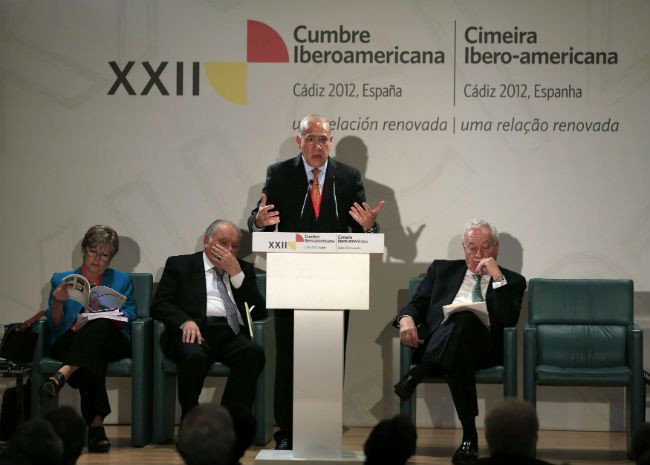
Spain and Portugal sought help on Friday from their former Latin American colonies, looking for a wave of trade and investment across the Atlantic Ocean to rescue them from economic crisis.
Suffering deep recession and with their citizens demonstrating against job losses and public spending cuts, the two European countries hope the Ibero-American Summit can open up desperately needed trading opportunities.
Figures released by the Organisation for Economic Cooperation and Development (OECD) on Friday highlighted the continents' contrasting fortunes by forecasting growth in Latin America of 3.2 percent in 2012 and 4 percent in 2013.
"Latin America offers a huge opportunity for Spain. We have the language, we have the culture, we have many years of investing there," Spanish Foreign Minister Jose Manuel Garcia-Margallo said at a businessforum on the summit's first day.
"Many achievements - and many errors. Spain and Portugal are Latin America's closest friends."
The plight of the former imperial powers has lent purpose to a summit that in recent years has resembled a redundant, ceremony-laden event dominated by the antics of populist leaders such as Venezuelan President Hugo Chavez.
Chavez is not attending this meeting taking place in the historic port city of Cadiz that prospered in the centuries of Spanish rule in the Americas.
Although the official host is Spain's King Juan Carlos, the most important figure is Dilma Rousseff, president of economic powerhouse Brazil.
Spain has made clear it regards Portuguese-speaking Brazil as vital to its salvation. Spanish Prime Minister Mariano Rajoy wrote this week in Brazilian magazine Epoca Negocios that he wanted "more Brazil in Spain and more Spain in Brazil".
Spain is already the second-biggest foreign investor in Brazil and Rajoy wants Spanish companies to get a slice of infrastructure projects, such as ports, highway and airports, including those for the 2014 World Cup and 2016 Olympics in Brazil. Rousseff will stay on in Spain for bilateral talks.
Major Spanish companies such as Telefonica (TEF.MC) and banking giant Santander (SAN.MC) now rely on their Latin American operations, and Brazil in particular, for a hefty chunk of their profits as local markets decline.
On Friday Spanish technology company Indra (IDR.MC) said a quarter of its revenue this year will come from Latin America, where its sales have increased 12-fold over the last 6 years. Brazil is its second biggest market after Spain.
WORKING FOR KOREANS
However, the summit is also focusing on finding ways to get small and medium-sized companies from Spain and Portugal into Latin America and its market of nearly 600 million people.
Alicia Barcena, executive secretary for the Economic Commission for Latin America and the Caribbean (ECLAC), urged Spanish banks to finance such businesses.
"Spain has to help us here," she told the business forum.
Spanish banks, crippled by the collapse in 2008 of a 10-year building boom, have severely curtailed lending to focus on recapitalizing to compensate for hundreds of billions of euros in bad loans.
OECD Secretary-General Angel Gurria, a Mexican, said Latin America still needed professional expertise, infrastructure, education and technology.
"If we don't change this trend we will all be working for the Koreans," he said.
Portugal is also keen to attract Brazilian investment for the privatizations it has been forced to carry out under the terms of its euro zone bailout.
But it turned to China for the sale of a stake in utility Energias de Portugal (EDP) last year, rejecting Brazil's Eletrobras (ELET6.SA) despite heavy lobbying.
In the privatization of airport operator ANA, a Colombian construction company, Odinsa, is involved in a bidding consortium, as is an Argentine and Brazilian firm. Colombian-Brazilian tycoon German Efromovich is vying to buy Portuguese flag carrier TAP.
Big Portuguese companies still have large stakes in Brazil, including EDP and Portugal Telecom, which have helped support them after earnings slumped at home due to the recession.
While the summit reaffirms historic ties and is making much of solidarity in troubled times, there are cracks in some relationships, especially those involving left-leaning governments.
Spain and Argentina are still in dispute over the nationalization of Spanish oil major Repsol's (REP.MC) YPF unit in April. Argentine President Cristina Fernandez cried off the summit on health grounds.
"We have much to discuss with Argentina," Garcia-Margallo said.
© Thomson Reuters.




